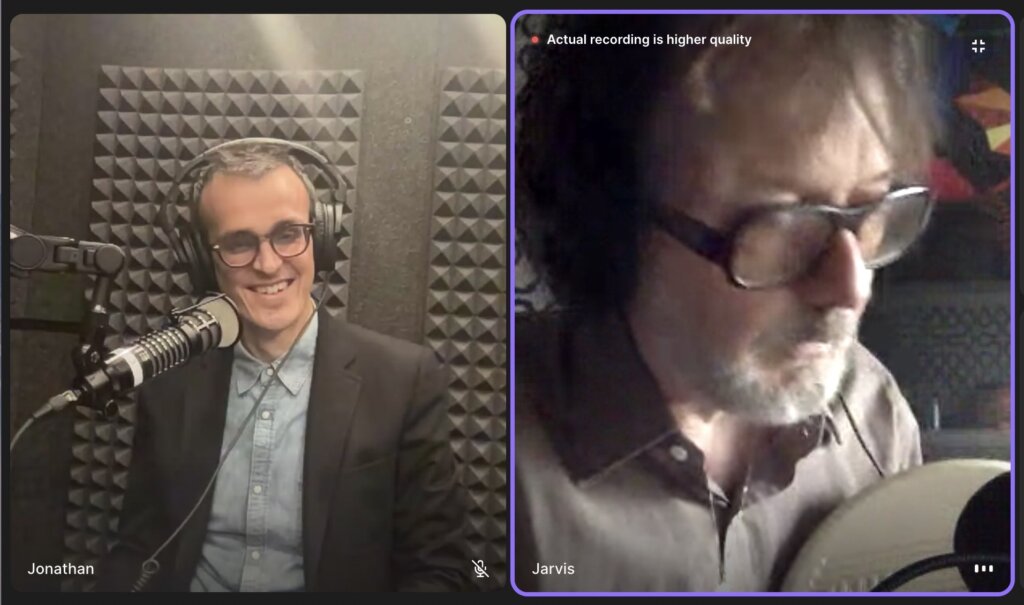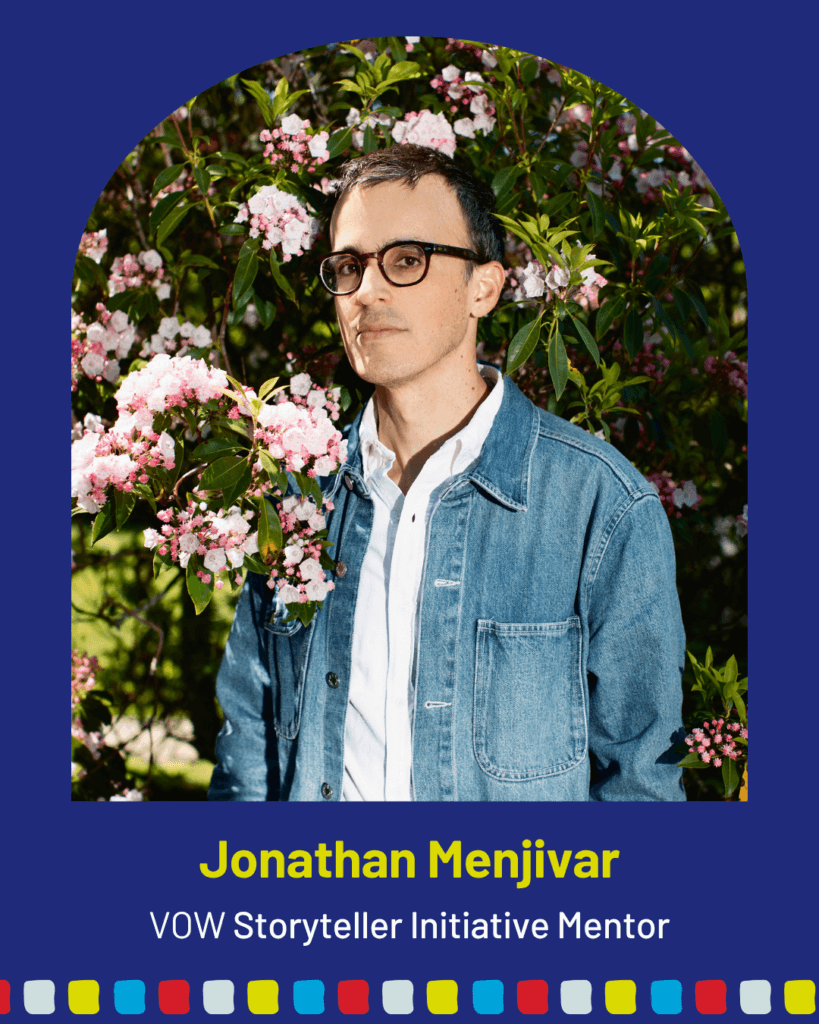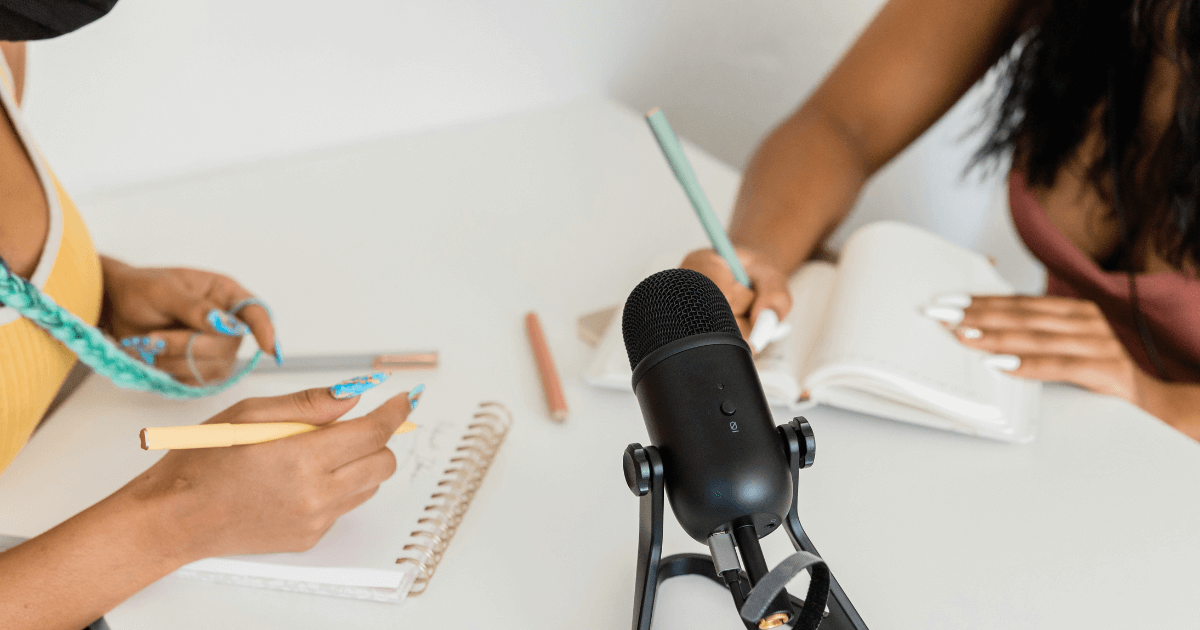By Claire Reisberg

Jonathan Menjivar interviewing Pulp frontman Jarvis Cocker for Episode 6 of Classy.
When creating a story for the radio, Jonathan Menjivar doesn’t think about his future listeners. He is focused on the here and now — on creating a story that people will tune into week after week. And they do. Despite what he calls the “fleeting” nature of radio, Jonathan has worked on shows and podcasts that leave a lasting impression on his listeners, who are drawn to his ability to reveal the sometimes uncomfortable truths of human nature through the intimate act of asking questions and listening. During our interview, Jonathan and I discussed his career path, storytelling journey, and transition from mentee to mentor.
Jonathan Menjivar is a podcast producer and reporter. He began his career working at Fresh Air with Terry Gross and was a long-time producer and music supervisor at This American Life. He has produced multiple hit shows with Pineapple Street Studios. His podcast Classy with Jonathan Menjivar was named as one of the best podcasts of 2023 by The New Yorker, Time, The Atlantic, Apple, Vogue, the CBC, and Lifehacker, and recently was included in Time Magazine’s “The 100 Best Podcasts of All Time.” Classy is a deeply moving, constantly surprising, and profoundly funny reflection on how class permeates every aspect of our lives and why it is so uncomfortable to talk about.
Jonathan Menjivar is also the mentor of Kristal Sotomayor, an award-winning filmmaker, journalist and curator. They are one of the fellows in VOW’s Storyteller Initiative, a program that provides support to storytellers from historically marginalized communities to help them develop and launch a creative project of their choosing grounded in oral history methods and ethical storytelling principles. Kristal is in the process of creating an audio documentary to shed light on the dangers of water privatization in Pennsylvania communities through oral history narratives.
What drew you to radio and podcasting as a form of storytelling as opposed to other mediums? How did you first realize this was what you wanted to do?
It happened by accident. I came from a working class background and was the first person in my family to go to college. And so there was no guide of exactly what you do. I was an American Studies major, which is a very super interesting field of study that leads you to do absolutely nothing except teach American Studies. That’s a joke because I really do think it taught me how to think. It taught me how to be a cultural analyst of a kind, how to break down various cultural elements, books, movies, TV, buildings, museum exhibits, all sorts of things.
I hadn’t grown up listening to public radio, but I’m from Southern California, and there is a fantastic public radio station called KCRW that I listened to for the music because it was the only place where you could hear independent music. I heard This American Life for the first time, probably in 1995 or ’96, and was just completely blown away. I was like, “I think this is what I want to do.” But I had no idea how to get there. I briefly considered magazine journalism. But radio seemed easier. I thought of it as like, “I’m a half-ass writer and a half-ass musician. Maybe I can put those two halves together and be okay on the radio.”
I remember I had a tape recorder and I put it on the dash of a car when my friend and I were driving from LA to Las Vegas. I expected something interesting was going to happen if I just pressed record. Absolutely nothing interesting happened.
I started volunteering at KCRW – it was basically an internship where I would sometimes volunteer on music shows. I did a lot of work at events. I answered phones at the front desk. Eventually, I got a job there being a volunteer coordinator for pledge drives. None of it had anything to do with what I actually wanted to do, but I was in the room and around the people. And eventually somebody there taught me how to edit tape.
I started interviewing my friends and putting together my first stories. I spent five or six years doing temp work, and then making 2-3 stories a year that I would get on public radio shows. I had a day job as a grant writer for a nonprofit organization. And I quit that job, and I freelanced for a year to really build my resume doing public radio. I made $12,000 that year. It was a kick in the ass so that I would have to do it to live. I got better that year. I got good enough that I got my job at Fresh Air.
Do you see any connections between podcasting and oral history? Would you describe what you do as oral history or as a different kind of storytelling?
When you’re making a story for a podcast or for the radio, you know it’s going to go out to lots of people, and so there is an element of making sure it’s entertaining, making sure that it’s a thing that people want to keep listening to. I want people to get to the end. So I’m not just preserving this story for history’s sake. I don’t know if anyone’s ever going to go back to the things I do, particularly radio. The radio is so fleeting. With podcasts, it’s less fleeting because they stick around and people can listen to them whenever they want. I still occasionally hear from people who have just heard Classy for the first time, and it came out two years ago. Maybe historians will come back and look at what we have done, but I don’t think about that audience at all when I’m making stuff.
In that way, it feels very different than oral history to me, but the desire to go into various corners of whatever you’re interested in and talk to people and find out what their stories are, and particularly to seek out people who are not famous, who don’t usually have somebody ask them, “What’s your story?” That element to me feels very similar. It’s a real gift to be able to walk in anywhere and just meet somebody, even if it’s for an hour, and to be like, “Tell me everything. Tell me all of the things that you’re afraid to talk about and the things you just think about and never even say out loud.” Even that last episode of Classy, I learned stuff that I had never known from people who had been in my life my entire life. And that’s pretty powerful.

Have you had any important mentors throughout your career? Are there any lessons you’ve learned from them that you apply to your mentorship with Kristal Sotomayor? What have you been working on together?
I’ve had some incredible mentors. I’ve been lucky enough to work with some of the best people in the industry. Fresh Air was my radio grad school, working on a daily show where you’re just constantly doing the work. It creates real muscles. You got to grind every single day. I’ve learned both from Terry Gross and the executive producer, Danny Miller, and so many other people there. Then having the chance to work with Ira Glass and Julie Snyder, and everybody else at This American Life. I think the biggest thing I learned when I was at This American Life is that you don’t have to pretend that you know how to do things. It’s okay to pull somebody, and it doesn’t have to be your boss, but to pull somebody aside and basically say to them, “I think I need some mentorship. I think I need some help in this department. Can you tell me what I’m missing?” That’s going to help you move forward a lot faster than just pretending like you know how to do everything already.
There are a bunch of things when you start doing this work that you don’t know how to do. And some people know what those things are. Some people know, “Okay, I need to learn how to become a better reporter,” or “I need to learn how to score stories.” But some people, like me at the beginning of my career, are completely lost and don’t know what they don’t know. And so I really try to sit down with people and say, “Okay, what are you interested in? What do you want to know? Do you want to be a reporter? Do you want to be a host one day? Are you interested in becoming an editor? Are you more interested in the writing or the production part of it? Do you want to know all of it?” And really trying to have some middle ground of both throwing people into work, but also holding their hand through it.
Kristal and I did this at the beginning. Kristal’s project is more of an advocacy journalism project, and it’s very personally driven for them. I’m a non-partisan journalist. And so we’re negotiating a lot of that stuff and trying to figure out, “Okay, what are all of the things you want to make sure are included in this?” If they are going to be partnering with public radio stations or anything like that, “What are the considerations of who might help you support this project?”
Mentorship is really important to me. Maybe this is very selfish, but I want this field to feel open to people like myself who are from nontraditional backgrounds, who didn’t necessarily have the exposure to this stuff when they were growing up, but are interested in it.
Learn more about VOW’s Storyteller Initiative here and support the fellowship program with a donation here.
Claire Reisberg is a student at Haverford College pursuing a major in English with minors in Comparative Literature and Growth and Structure of Cities and a concentration is Peace, Justice, and Human Rights. She is the summer intern at Voice of Witness where she has been thrilled to learn more about the world of oral history and support the VOW Editorial, Education, and Development departments.




